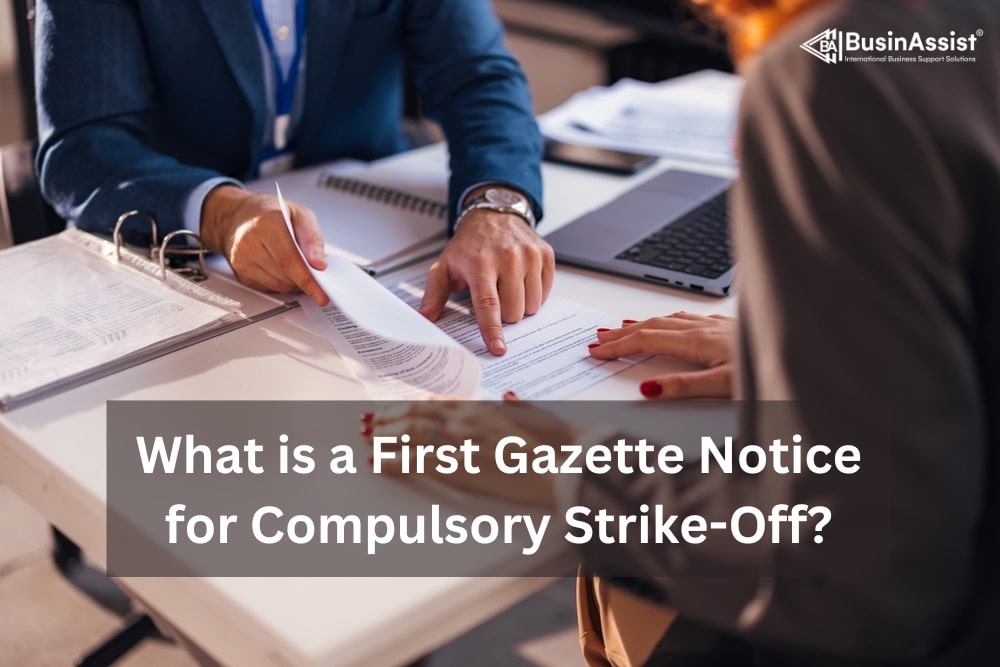Relevance of the First Gazette Notice in Compulsory Strike Off
Relevance of the First Gazette Notice in Compulsory Strike Off
Blog Article
Recognizing the Process and Implications of Compulsory Strike Off Under Company Law
In the realm of business regulation, the procedure and effects of compulsory strike off hold significant weight for organizations and their directors. Recognizing the intricacies of why companies face such a result, the thorough steps associated with the strike off process, and the far-ranging ramifications for all events included is crucial in navigating the complicated landscape of company governance. As we dig into the reasons behind mandatory strike offs, the ensuing treatments, and the succeeding consequences, a clearer picture arises of the extensive influence it can carry entities and individuals alike.
Reasons for Compulsory Strike Off
Compulsory strike off under business regulation is started by the regulatory authorities for certain factors associated with non-compliance or operational irregularities. The primary factor for a business to encounter compulsory strike off is the failure to file annual returns or financial declarations for an extensive duration. This non-compliance shows a lack of openness and adherence to regulatory requirements, increasing worries regarding the business's financial health and wellness and accountability.

Refine of Strike Off
Provided the governing authority's initiation of mandatory strike off for numerous factors, recognizing the process of strike off is critical for business dealing with potential dissolution under firm law. The process typically begins with the governing authority sending notices to the firm's authorized office address, notifying them of the approaching strike off. It is necessary for the business to deal with any kind of exceptional concerns, such as submitting past due papers or clearing up superior fees, within the specified duration to prevent dissolution.

Ramifications for Companies
What are the implications for firms dealing with required strike off under firm legislation? Companies dealing with compulsory strike off might run into a number of considerable ramifications. To start with, the company discontinues to lawfully exist, leading to the loss of its corporate standing and the coming with advantages and protections. This can bring about the failure to become part of contracts, conduct organization, or pursue lawsuits in the firm's name.
Additionally, the firm's assets at the time of strike off come to be building of the state, which can bring about economic losses for investors and creditors. Investors might lose their investments, while creditors might have a hard time to recuperate any kind of arrearages owed to them by the struck-off company.
Additionally, directors of the business may deal with disqualification from holding comparable placements in various other firms for a specified period (compulsory strike off). This can taint their professional reputation and limit their future service opportunities
Effects for Directors
Encountering obligatory strike off under firm regulation can have serious implications for supervisors, impacting their future roles in other business and potentially tarnishing their expert standing. Supervisors of a company encountering required strike off may find it testing to protect directorial placements in various other firms in the future. This is due to the fact that the strike off suggests a failing to abide by legal responsibilities, elevating problems about the supervisor's ability to fulfill their obligations properly. The tainted expert track record resulting from a mandatory strike off can lead to a loss of depend on from company partners, customers, and stakeholders. Supervisors might additionally face personal monetary liabilities if they are discovered to have acted negligently or fraudulently, causing prospective lawful actions versus them. Generally, the effects of compulsory strike off for supervisors prolong beyond the specific company concerned, influencing their profession potential customers and professional trustworthiness in the long-term.
Preventing Compulsory Strike Off

Verdict
Finally, recognizing the process and implications of mandatory strike off under firm legislation is essential for supervisors and firms to make sure compliance with regulations. By recognizing the factors for strike off, the procedure entailed, and the consequences for all parties included, business can take steps to stay clear of undergoing compulsory strike off. It is very important for directors to be aggressive in maintaining correct records and conference legal obligations to stop the danger of strike off.
Given the regulative authority's initiation of compulsory strike off for numerous reasons, comprehending the process of strike off is essential for companies encountering possible dissolution under company regulation.What are the implications for business dealing with compulsory strike off under business legislation?Encountering required strike off under business legislation can have extreme ramifications for directors, influencing their future duties in various other business and potentially tainting their professional standing. Directors of a business dealing with obligatory strike off may find it challenging to protect directorial positions in various other firms in the future.In final thought, comprehending the process and effects of compulsory strike off under company law is vital for directors and business to make certain conformity with laws.
Report this page